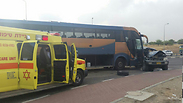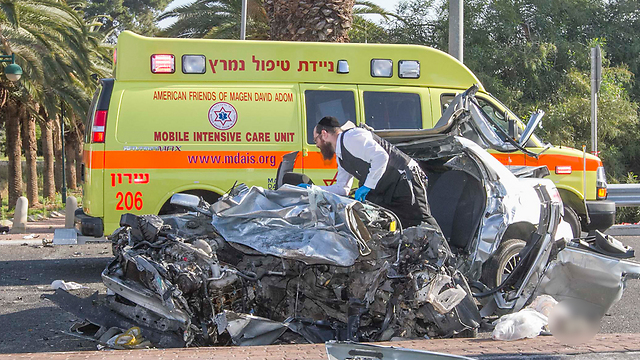
Traffic accident fatalities spike in 2015
Fatal crashes up by 35 percent compared to the same period last year; last week was the deadliest of the year on the roads; some researchers blame poor infrastructure.
The number of people killed in car accidents so far in 2015 is 143, compared to 108 during the same period last year.
According to statistics from Or Yarok Association for Safer Driving, this is a significant increase of about 35 percent in fatalities. Last week was the deadliest this year on the roads, with 17 mortalities. A serious accident on Thursday this week killed another three people.
Riva Ilchenko lost her daughter and husband in an accident on Route 31 last year. Each report of a crash takes her back to those terrible moments on the road. "Is anyone thinking about us? No one is thinking about the citizens," she said.
"The government is the same and nothing has changed. This is what our country looks like. They aren't really working to improve the situation. The roads are narrow and there's no public transportation, but who thinks about that? I am dealing with my loss every day and it's hard for me to fight.
"If people were to organize and do something, demand a change on the roads, maybe something would change. There's a car accident every day. It could happen to anyone, but people are still apathetic and prefer to think about their daily struggle instead of the struggle on the roads."
"The state is not doing very much," said Ilan Mensch, who lost his 37-year-old wife Gali two and half years ago, also in an accident on Route 31. "It seems like they keep waiting another day and another day… Everything is handled clumsily and slowly and it ultimately costs lives.
"The state has a slow response time and that's the main problem. There is an infrastructure problem and rampaging on the roads. The police needs to pay attention and implement massively more enforcement on these roads and junctions."
A 2014 report by Dr. Haneen Farah, a senior researcher at the Or Yarok Association, mapped transportation danger spots in Israel, including dangerous road sections and junctions.
According to the report, there are 326 kilometers of road sections designated as dangerous, as well as 85 junctions where 55 people are killed every year. The report said that infrastructure improvements could save most casualties.
Or Yarok CEO Shmuel Aboav said that "Israel is in a national emergency situation following the increase in the number of fatalities for the third year in a row. It's easiest to blame the driver, but the state bears responsibility as well. The new transportation minister must concentrate all the bodies that deal with traffic safety and work to lower the number of deaths on the roads. He must put saving human lives on the top of his agenda."
According to Dr. Gila Albert, a senior accident researcher at Or Yarok, said problems with infrastructure on dangerous stretches of road include lack of separation between lanes, wide shoulders, poor lighting, and shoddy asphalt. Albert said that in addition to the pain and tragedy caused by accidents, there is also a financial cost. "The cost of a fatality from a car accident is NIS 6.5 million, which is quite a bit," she said.
Albert further said that the cost of improving infrastructure is not high compared to other investments.
Transport Ministry Director Uzi Itzhaki said that infrastructure improvement is a policy of the ministry, which is headed by Israel Katz. Itzhaki noted the increase in fatalities with concern.
"From analyzing the accidents, unfortunately we are dealing with human factors like distraction, failure to maintain distance, excessive speeding, and more… when I say human factor I am also referring to pedestrian behavior, people who try to cross intercity roads and walk in the shoulders, pedestrians in cities who jaywalk. We urge pedestrians and drivers to increase alertness, not to handle cell phones while driving, and to pay attention to crosswalks."
According to Itzhaki, "the accidents cannot be attributed to infrastructure. Many junctions have traffic lights and infrastructure in the south has been upgraded." The state has invested about NIS 10 billion in roads in the Lachish area, in the south, and in Eilat.











